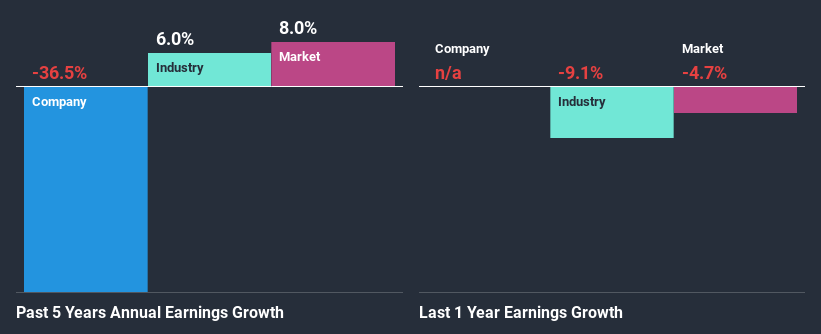- Hong Kong
- /
- Healthcare Services
- /
- SEHK:286
Is Aidigong Maternal & Child Health Limited's (HKG:286) Stock Price Struggling As A Result Of Its Mixed Financials?

Aidigong Maternal & Child Health (HKG:286) has had a rough month with its share price down 25%. It is possible that the markets have ignored the company's differing financials and decided to lean-in to the negative sentiment. Fundamentals usually dictate market outcomes so it makes sense to study the company's financials. Specifically, we decided to study Aidigong Maternal & Child Health's ROE in this article.
Return on equity or ROE is an important factor to be considered by a shareholder because it tells them how effectively their capital is being reinvested. In other words, it is a profitability ratio which measures the rate of return on the capital provided by the company's shareholders.
See our latest analysis for Aidigong Maternal & Child Health
How Do You Calculate Return On Equity?
The formula for return on equity is:
Return on Equity = Net Profit (from continuing operations) ÷ Shareholders' Equity
So, based on the above formula, the ROE for Aidigong Maternal & Child Health is:
3.1% = HK$41m ÷ HK$1.3b (Based on the trailing twelve months to June 2020).
The 'return' is the yearly profit. That means that for every HK$1 worth of shareholders' equity, the company generated HK$0.03 in profit.
What Is The Relationship Between ROE And Earnings Growth?
We have already established that ROE serves as an efficient profit-generating gauge for a company's future earnings. Based on how much of its profits the company chooses to reinvest or "retain", we are then able to evaluate a company's future ability to generate profits. Assuming all else is equal, companies that have both a higher return on equity and higher profit retention are usually the ones that have a higher growth rate when compared to companies that don't have the same features.
A Side By Side comparison of Aidigong Maternal & Child Health's Earnings Growth And 3.1% ROE
It is hard to argue that Aidigong Maternal & Child Health's ROE is much good in and of itself. Even when compared to the industry average of 7.2%, the ROE figure is pretty disappointing. For this reason, Aidigong Maternal & Child Health's five year net income decline of 37% is not surprising given its lower ROE. We believe that there also might be other aspects that are negatively influencing the company's earnings prospects. For example, the business has allocated capital poorly, or that the company has a very high payout ratio.
That being said, we compared Aidigong Maternal & Child Health's performance with the industry and were concerned when we found that while the company has shrunk its earnings, the industry has grown its earnings at a rate of 6.0% in the same period.

The basis for attaching value to a company is, to a great extent, tied to its earnings growth. What investors need to determine next is if the expected earnings growth, or the lack of it, is already built into the share price. Doing so will help them establish if the stock's future looks promising or ominous. Is Aidigong Maternal & Child Health fairly valued compared to other companies? These 3 valuation measures might help you decide.
Is Aidigong Maternal & Child Health Efficiently Re-investing Its Profits?
Aidigong Maternal & Child Health's low three-year median payout ratio of 9.6% (or a retention ratio of 90%) over the last three years should mean that the company is retaining most of its earnings to fuel its growth but the company's earnings have actually shrunk. The low payout should mean that the company is retaining most of its earnings and consequently, should see some growth. So there could be some other explanations in that regard. For example, the company's business may be deteriorating.
Additionally, Aidigong Maternal & Child Health has paid dividends over a period of at least ten years, which means that the company's management is determined to pay dividends even if it means little to no earnings growth.
Conclusion
In total, we're a bit ambivalent about Aidigong Maternal & Child Health's performance. While the company does have a high rate of reinvestment, the low ROE means that all that reinvestment is not reaping any benefit to its investors, and moreover, its having a negative impact on the earnings growth. Wrapping up, we would proceed with caution with this company and one way of doing that would be to look at the risk profile of the business. You can see the 3 risks we have identified for Aidigong Maternal & Child Health by visiting our risks dashboard for free on our platform here.
If you’re looking to trade Aidigong Maternal & Child Health, open an account with the lowest-cost* platform trusted by professionals, Interactive Brokers. Their clients from over 200 countries and territories trade stocks, options, futures, forex, bonds and funds worldwide from a single integrated account. Promoted
New: Manage All Your Stock Portfolios in One Place
We've created the ultimate portfolio companion for stock investors, and it's free.
• Connect an unlimited number of Portfolios and see your total in one currency
• Be alerted to new Warning Signs or Risks via email or mobile
• Track the Fair Value of your stocks
This article by Simply Wall St is general in nature. It does not constitute a recommendation to buy or sell any stock, and does not take account of your objectives, or your financial situation. We aim to bring you long-term focused analysis driven by fundamental data. Note that our analysis may not factor in the latest price-sensitive company announcements or qualitative material. Simply Wall St has no position in any stocks mentioned.
*Interactive Brokers Rated Lowest Cost Broker by StockBrokers.com Annual Online Review 2020
Have feedback on this article? Concerned about the content? Get in touch with us directly. Alternatively, email editorial-team (at) simplywallst.com.
About SEHK:286
Aidigong Maternal & Child Health
An investment holding company, provides postpartum care and healthcare services in the People’s Republic of China.
Moderate and good value.
Market Insights
Community Narratives



